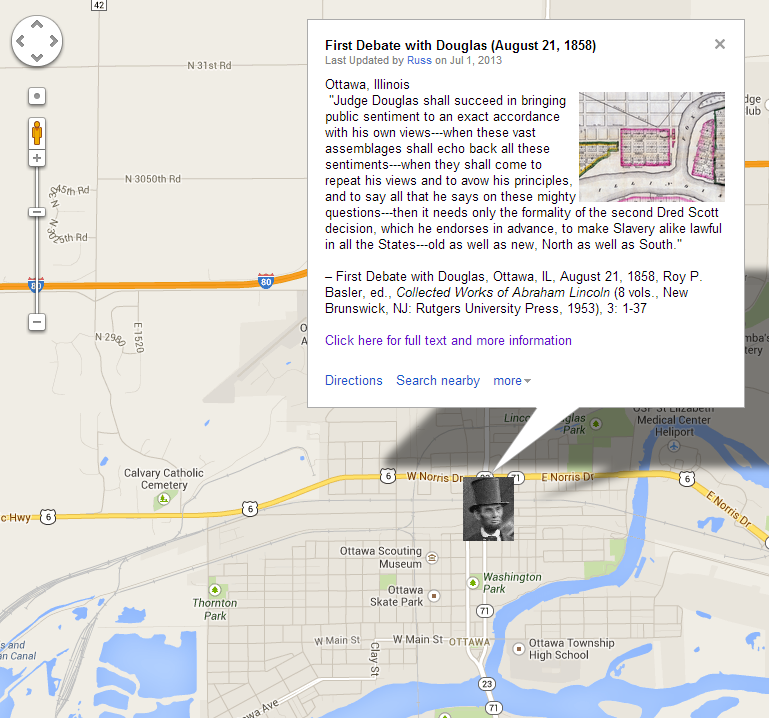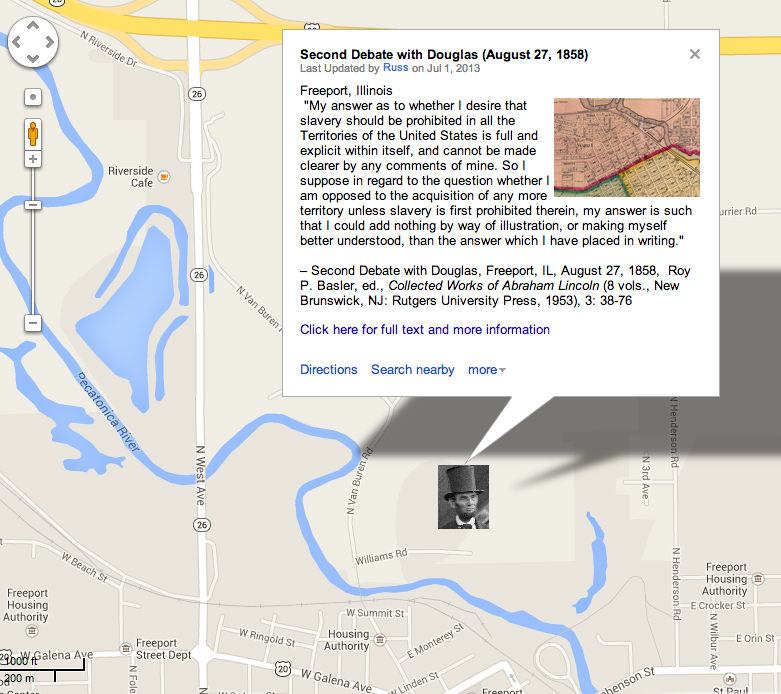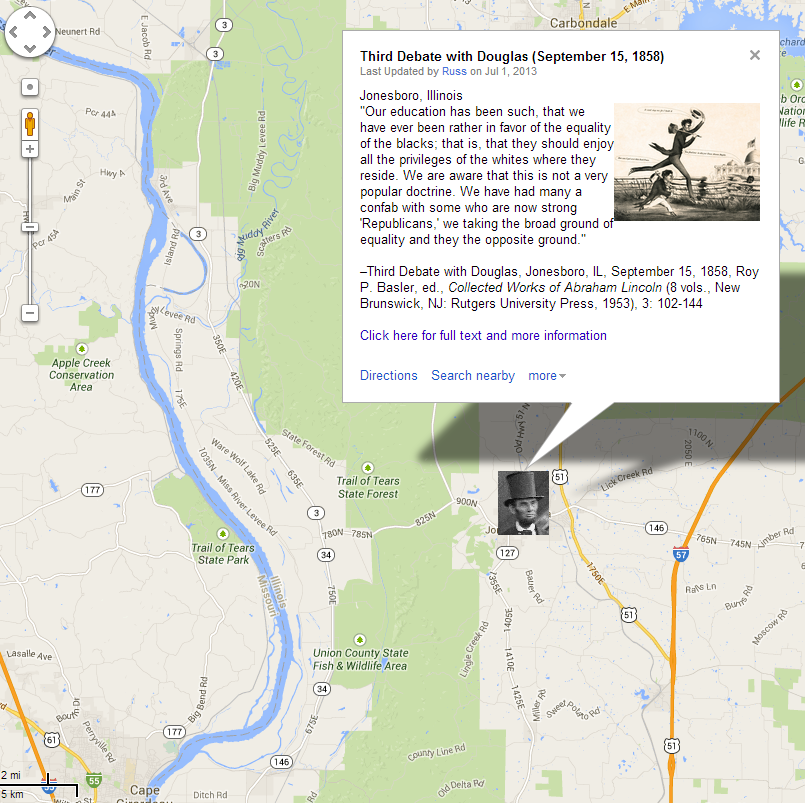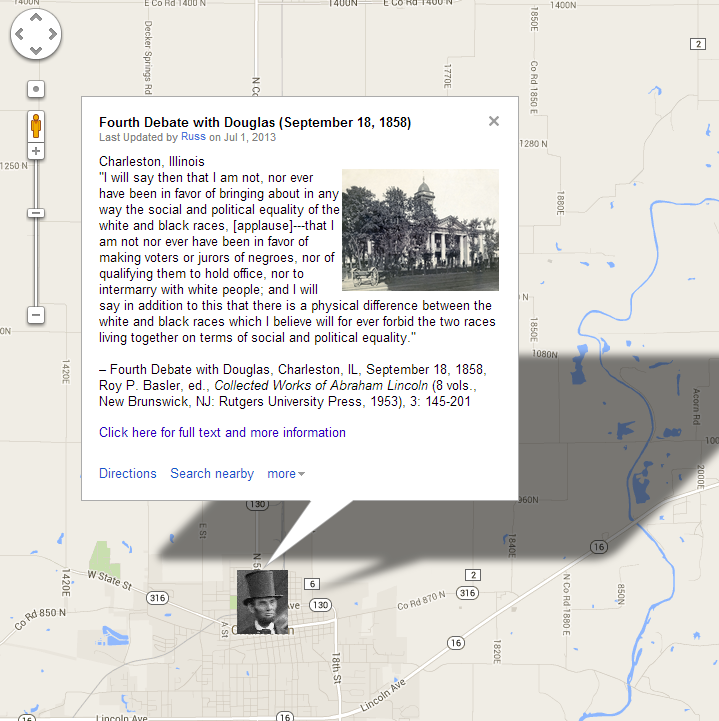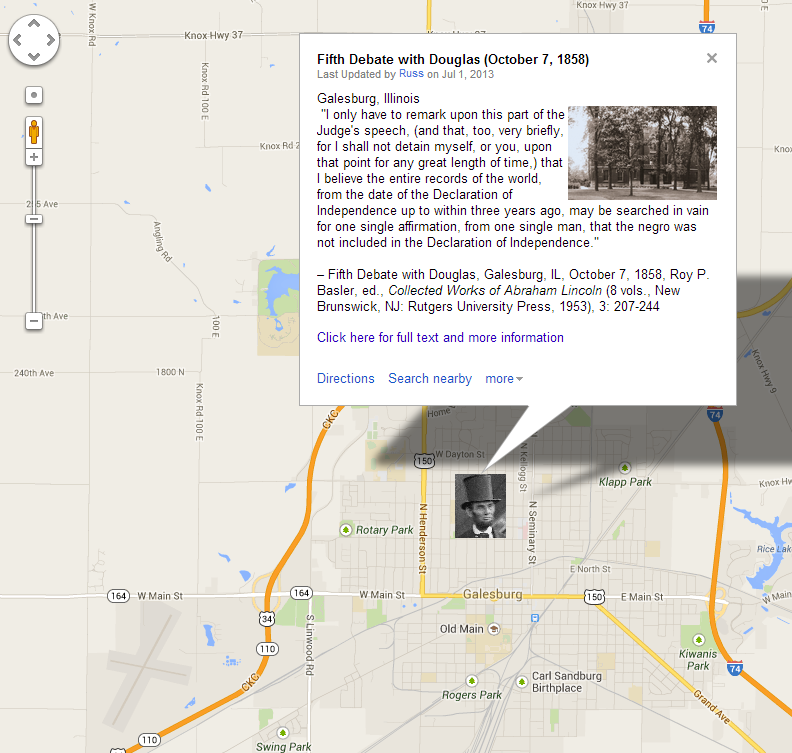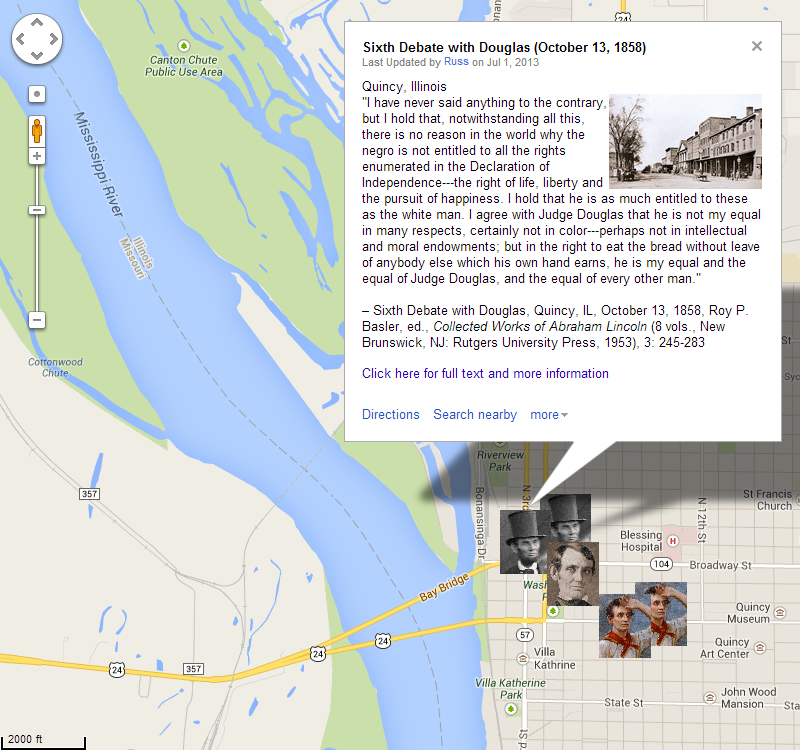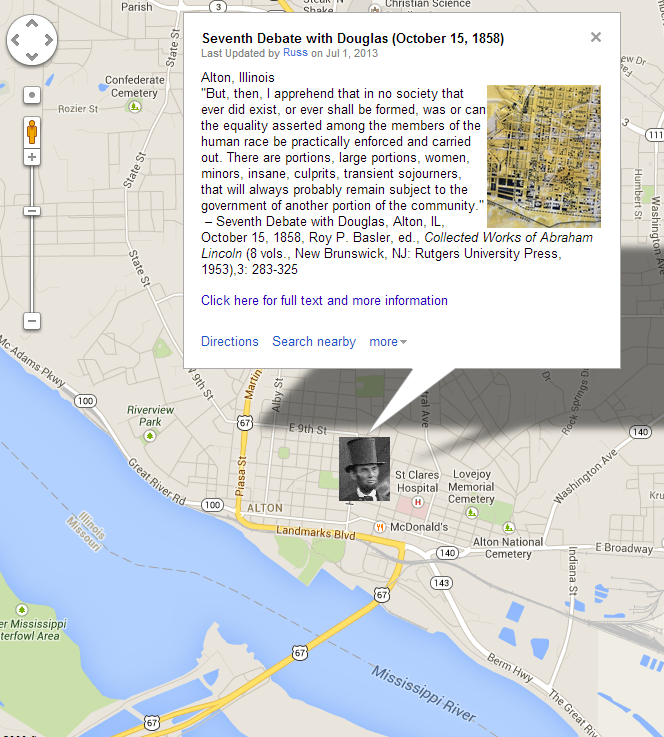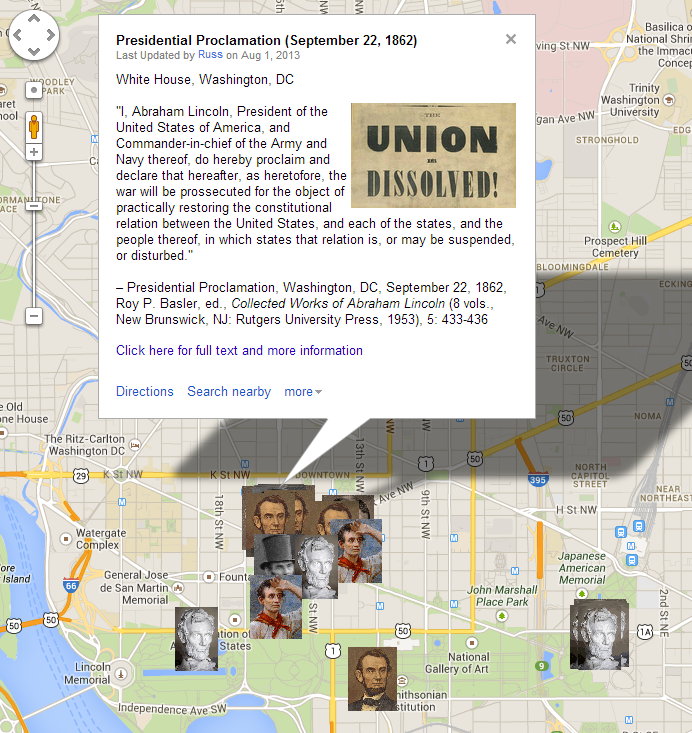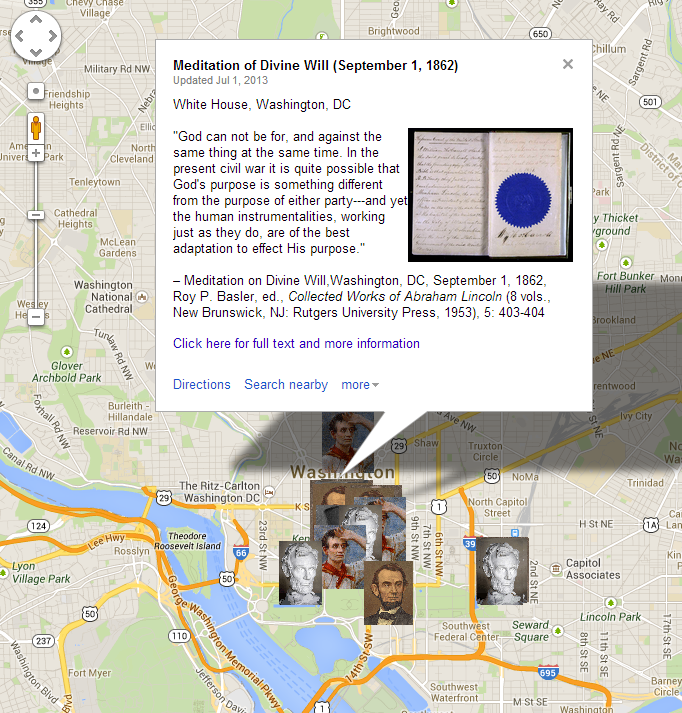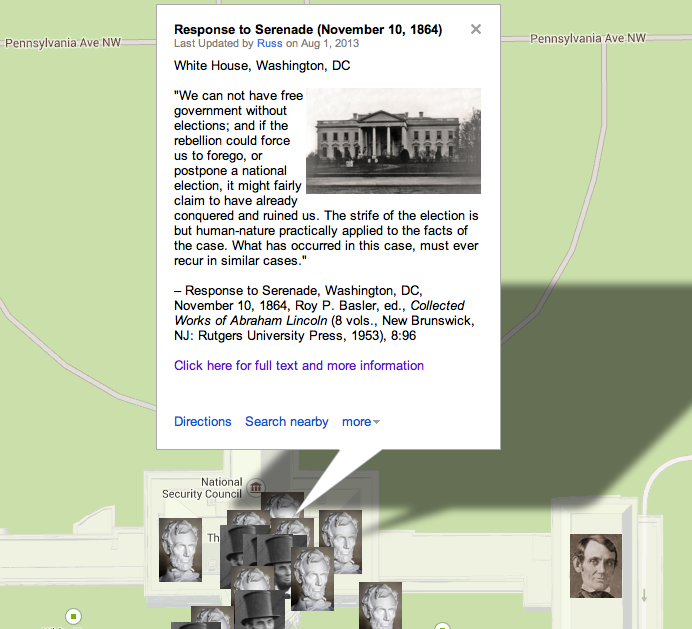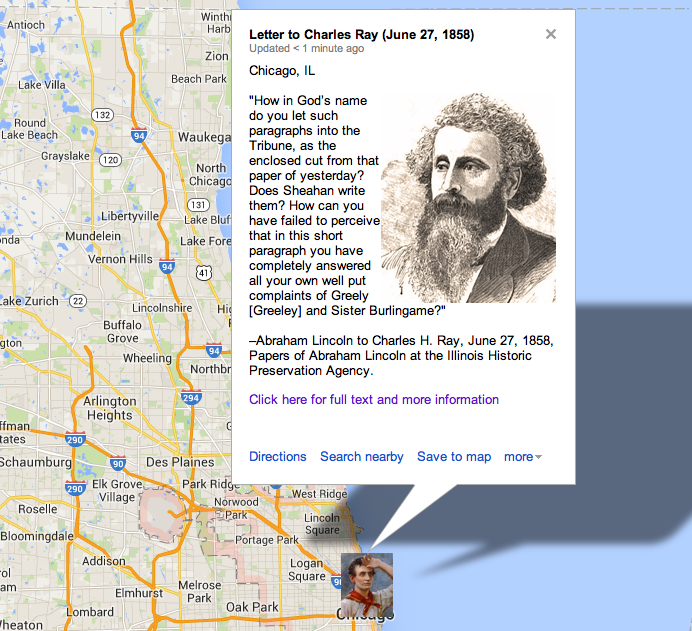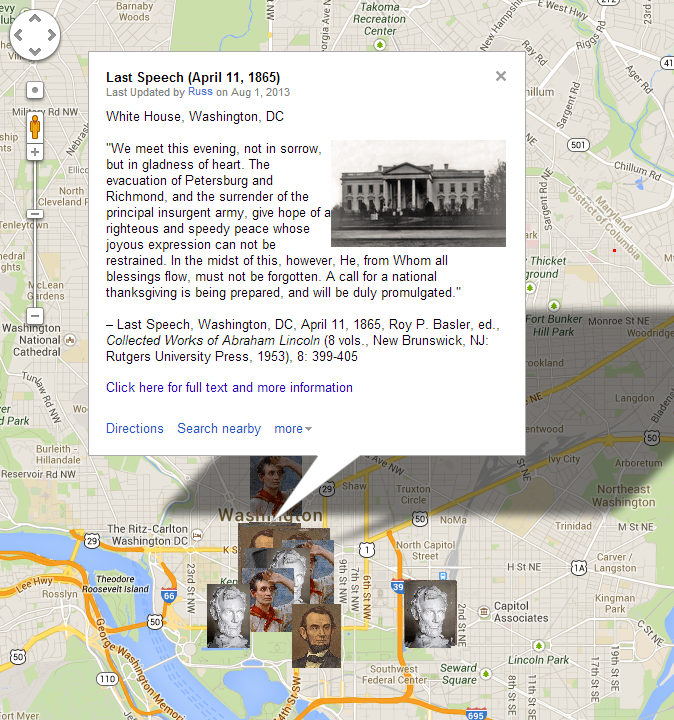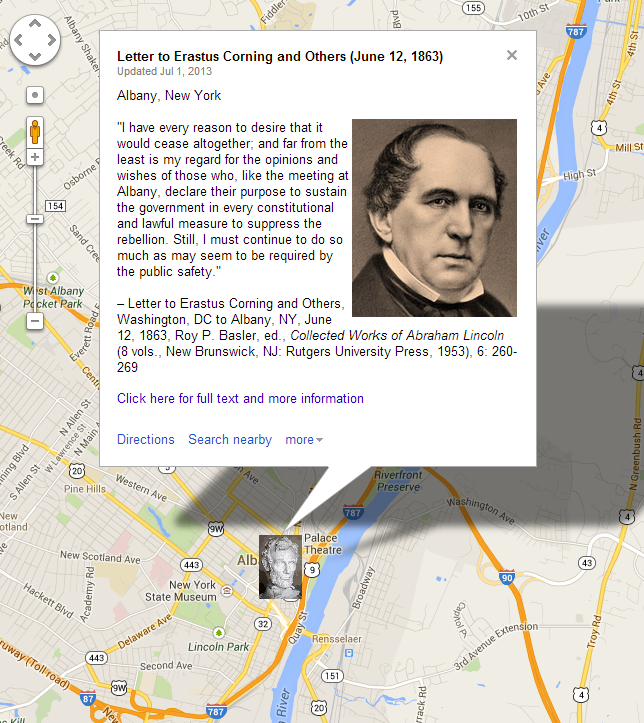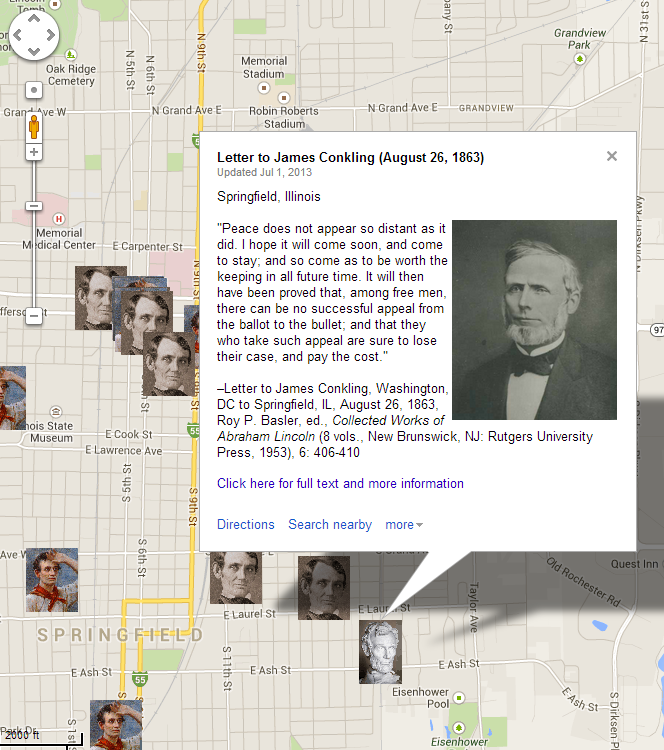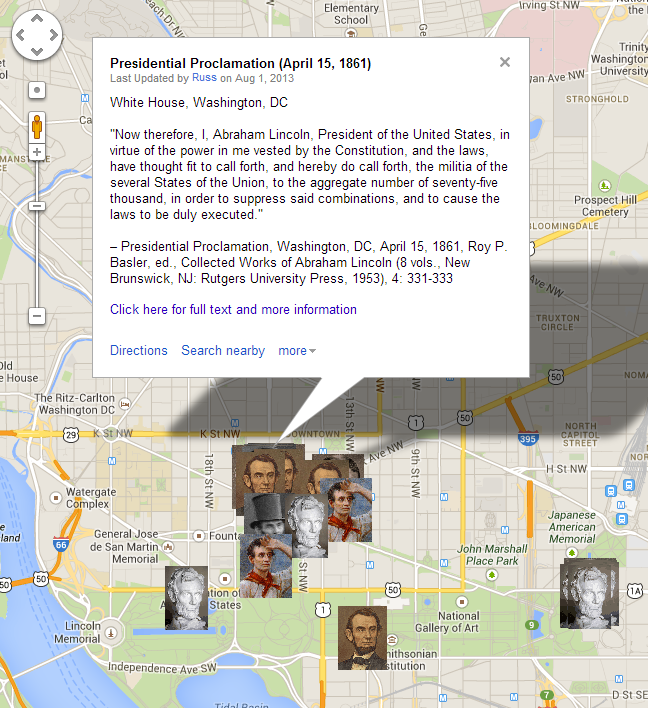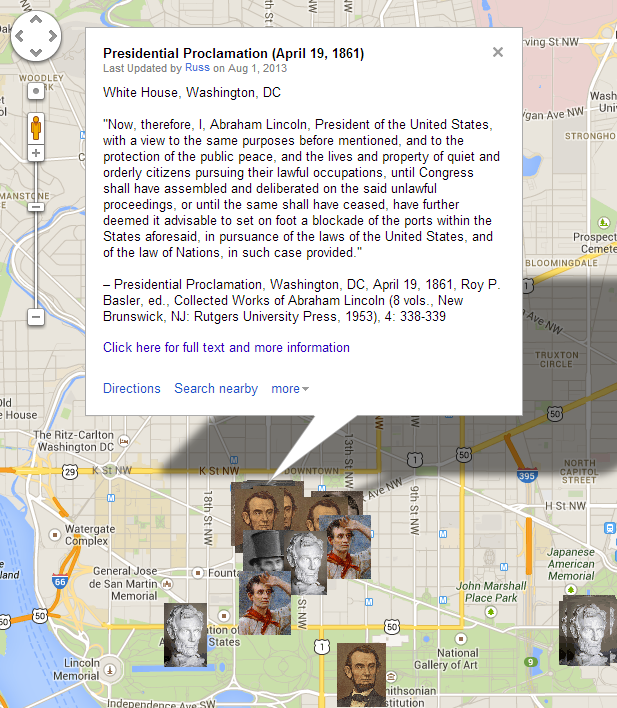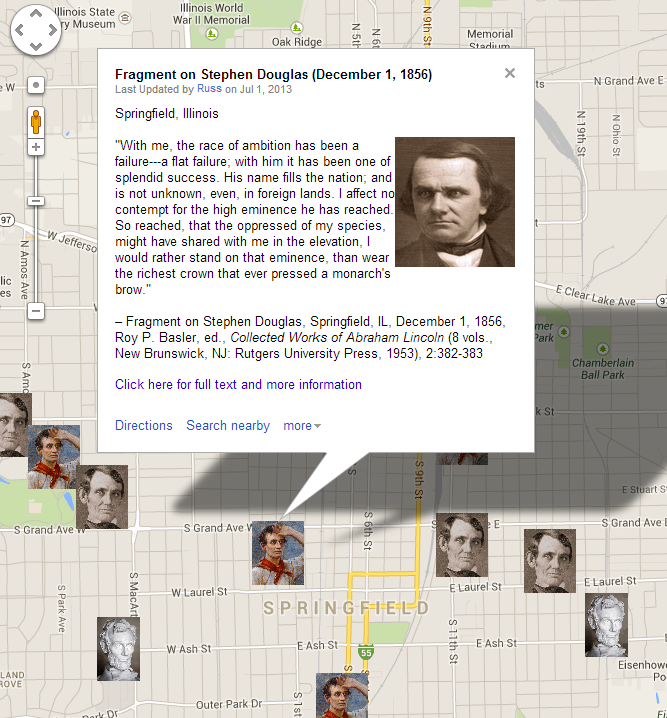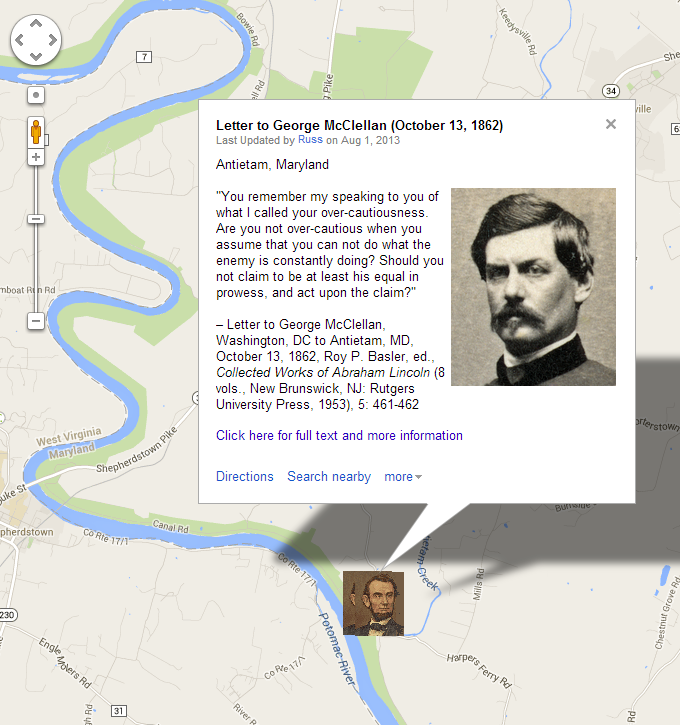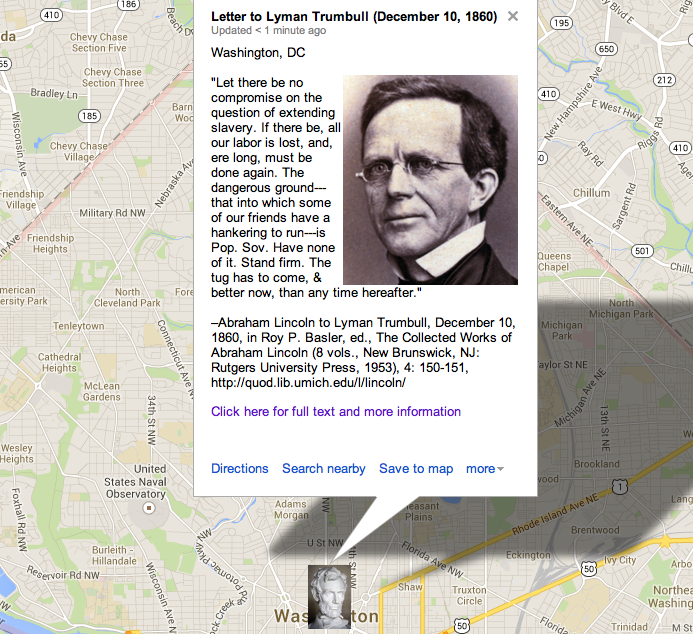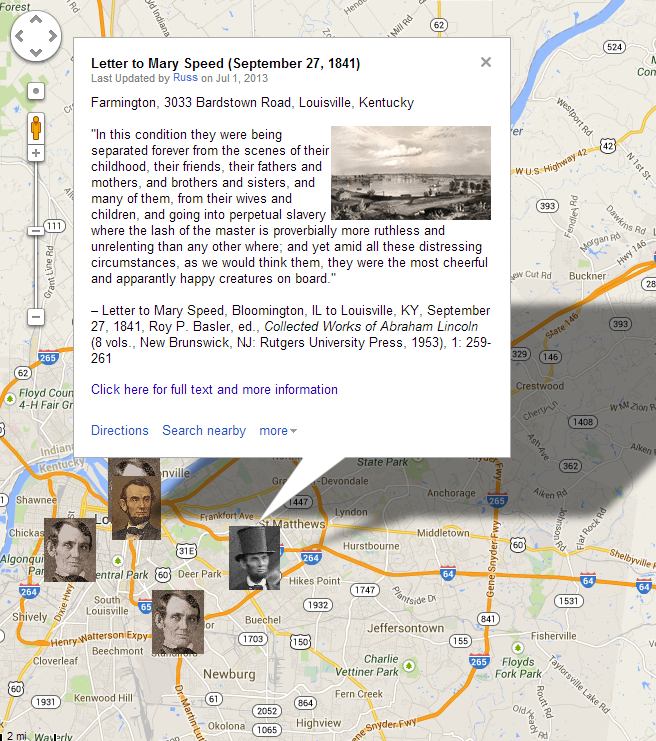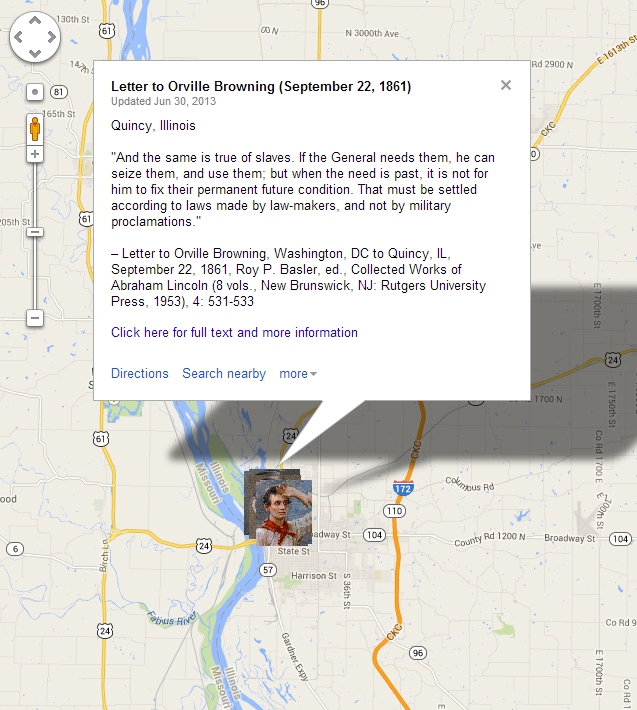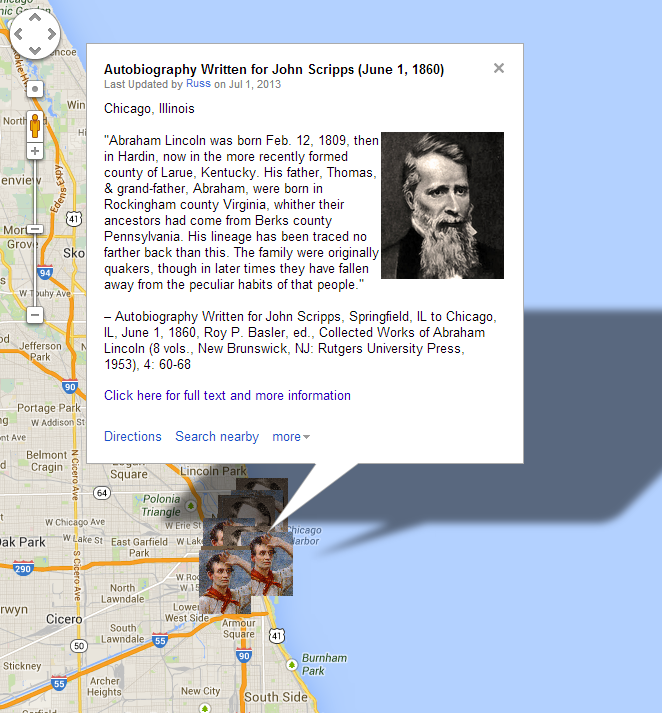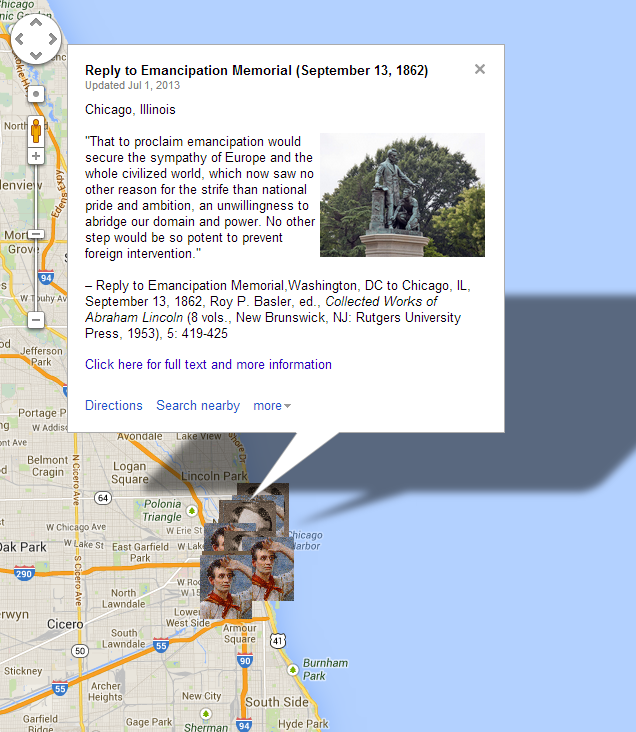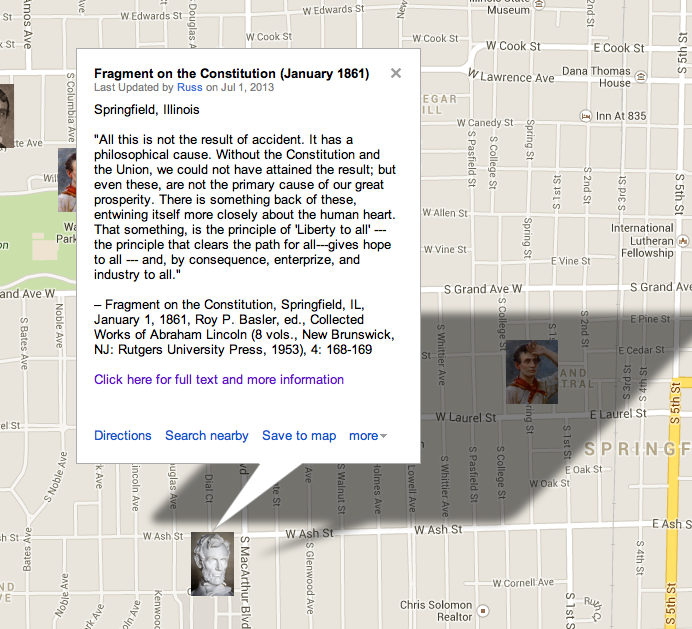Contributing Editors for this page include Susan Segal and Cynthia Smith
Ranking
#34 on the list of 150 Most Teachable Lincoln Documents
Annotated Transcript
“Having been convened on an extraordinary occasion, as authorized by the Constitution, your attention is not called to any ordinary subject of legislation.”
Audio Version
On This Date
HD Daily Report, July 4, 1861
The Lincoln Log, July 4, 1861
Close Readings
Susan Segal, “Understanding Lincoln” blog post (via Quora), September 23, 2013
Cynthia Smith, “Understanding Lincoln” blog post (via Quora), September 4, 2013
Custom Map
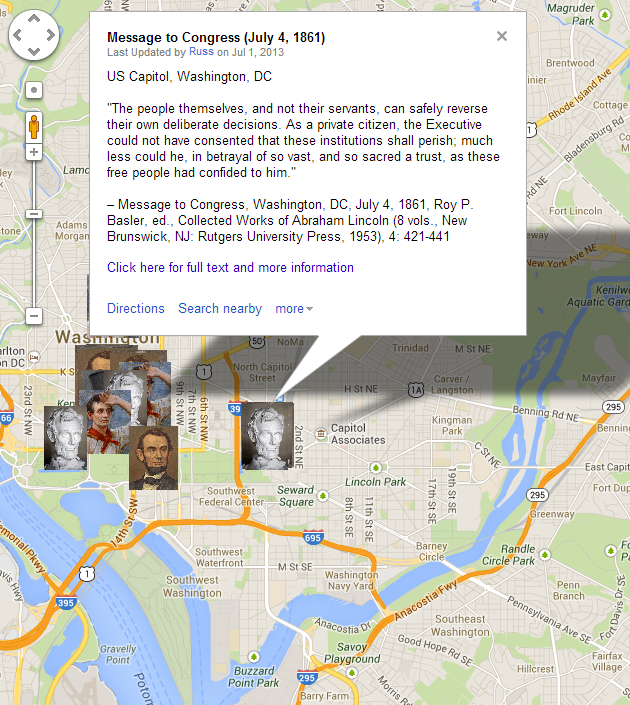
View in larger map
How Historians Interpret
“Lincoln’s most important task was to define the issue in terms that would bring home the tremendous importance of victory. His message to Congress gave him the finest possible opportunity for a wide hearing. After describing the outbreak of hostilities he struck the chord he wanted, one which, elaborated to perfection, he was to sound again in the Gettysburg Address two years later… This special message of July 4, 1861—which is not nearly so well known as it deserves to be—illustrates several of Lincoln’s traits as a thinker and a literary artist. One of these was the slow, gradual development of an idea. It was characteristic that the central idea of the passage I have just quoted should be repeated in the Gettysburg Address, for Lincoln habitually revolved an idea in his mind until it stood in exactly the right relation to the body of his thought. It was thus with the Cooper Union speech, the theme of which was first stated in 1854, and recurred to again and again until it reached its final development nearly six years later. And as such an idea was repeated, the sentences by which it was expressed were shaped and shifted and polished until they became the smooth fitting parts of a perfect entity. Another trait was the use of expressions, no matter how homely, which conveyed his exact meaning. Referring, in this special message, to those Southerners who had given the color of legality to secession, he said that “with rebellion thus sugar-coated” they had drugged the conscience of their section. The public printer objected to the phrase ‘sugar-coated’ on the ground that it lacked the dignity proper to a state paper. Lincoln replied that he would alter it if he could be convinced that the time would ever come when the people would not know the meaning of sugar-coated— otherwise he would let it remain.”
— Paul M. Angle, “Lincoln’s Power with Words,” Journal of the Abraham Lincoln Association 3, no. 2 (1981), 8-27.
“In July, Lincoln told Congress that it was “worthy of note, that while in this, the government’s hour of trial, large numbers of those in the Army and Navy, who have been favored with the offices, have resigned, and proved false to the hand which had pampered them, not one common soldier, or common sailor is known to have deserted his flag. Great honor is due to those officers who remain true, despite the example of their treacherous associates; but the greatest honor, and most important fact of all is, the unanimous firmness of the common soldiers and common sailors. To the last man, so far as known, they have successfully resisted the traitorous efforts of those, whose commands, but an hour before, they obeyed as absolute law. This is the patriotic instinct of the plain people. They understand, without an argument, that destroying the government, which was made by Washington, means no good to them.”(Actually, twenty-six enlisted men resigned to join the Confederacy.)”
— Michael Burlingame, Abraham Lincoln: A Life (2 volumes, originally published by Johns Hopkins University Press, 2008) Unedited Manuscript by Chapter, Lincoln Studies Center, Volume 2, Chapter 23 (PDF), 2433-2434.
NOTE TO READERS
This page is under construction and will be developed further by students in the new “Understanding Lincoln” online course sponsored by the House Divided Project at Dickinson College and the Gilder Lehrman Institute of American History. To find out more about the course and to see some of our videotaped class sessions, including virtual field trips to Ford’s Theatre and Gettysburg, please visit our Livestream page at http://new.livestream.com/gilderlehrman/lincoln
Searchable Text
July 4, 1861
Fellow-citizens of the Senate and House of Representatives:
Having been convened on an extraordinary occasion, as authorized by the Constitution, your attention is not called to any ordinary subject of legislation.
At the beginning of the present Presidential term, four months ago, the functions of the Federal Government were found to be generally suspended within the several States of South Carolina, Georgia, Alabama, Mississippi, Louisiana, and Florida, excepting only those of the Post Office Department.
Within these States, all the Forts, Arsenals, Dock-yards, Customhouses, and the like, including the movable and stationary property in, and about them, had been seized, and were held in open hostility to this Government, excepting only Forts Pickens, Taylor, and Jefferson, on, and near the Florida coast, and Fort Sumter, in Charleston harbor, South Carolina. The Forts thus seized had been put in improved condition; new ones had been built; and armed forces had been organized, and were organizing, all avowedly with the same hostile purpose.
The Forts remaining in the possession of the Federal government, in, and near, these States, were either besieged or menaced by warlike preparations; and especially Fort Sumter was nearly surrounded by well-protected hostile batteries, with guns equal in quality to the best of its own, and outnumbering the latter as perhaps ten to one. A disproportionate share, of the Federal muskets and rifles, had somehow found their way into these States, and had been seized, to be used against the government. Accumulations of the public revenue, lying within them, had been seized for the same object. The Navy was scattered in distant seas; leaving but a very small part of it within the immediate reach of the government. Officers of the Federal Army and Navy, had resigned in great numbers; and, of those resigning, a large proportion had taken up arms against the government. Simultaneously, and in connection, with all this, the purpose to sever the Federal Union, was openly avowed. In accordance with this purpose, an ordinancehad been adopted in each of these States, declaring the States, respectively, to be separated from the National Union. A formula for instituting a combined government of these states had been promulgated; and this illegal organization, in the character of confederate States was already invoking recognition, aid, and intervention, from Foreign Powers.
Finding this condition of things, and believing it to be an imperative duty upon the incoming Executive, to prevent, if possible, the consummation of such attempt to destroy the Federal Union, a choice of means to that end became indispensable. This choice was made; and was declared in the Inaugural address. The policy chosen looked to the exhaustion of all peaceful measures, before a resort to any stronger ones. It sought only to hold the public places and property, not already wrested from the Government, and to collect the revenue; relying for the rest, on time, discussion, and the ballot-box. It promised a continuance of the mails, at government expense, to the very people who were resisting the government; and it gave repeated pledges against any disturbance to any of the people, or any of their rights. Of all that which a president might constitutionally, and justifiably, do in such a case, everything was foreborne, without which, it was believed possible to keep the government on foot….
…And this issue embraces more than the fate of these United States. It presents to the whole family of man, the question, whether a constitutional republic, or a democracy—a government of the people, by the same people—can, or cannot, maintain its territorial integrity, against its own domestic foes. It presents the question, whether discontented individuals, too few in numbers to control administration, according to organic law, in any case, can always, upon the pretences made in this case, or on any other pretences, or arbitrarily, without any pretence, break up their Government, and thus practically put an end to free government upon the earth. It forces us to ask: “Is there, in all republics, this inherent, and fatal weakness?” “Must a government, of necessity, be too strong for the liberties of its own people, or too weak to maintain its own existence?”
So viewing the issue, no choice was left but to call out the war power of the Government; and so to resist force, employed for its destruction, by force, for its preservation….Soon after the first call for militia, it was considered a duty to authorize the Commanding General, in proper cases, according to his discretion, to suspend the privilege of the writ of habeas corpus; or, in other words, to arrest, and detain, without resort to the ordinary processes and forms of law, such individuals as he might deem dangerous to the public safety. This authority has purposely been exercised but very sparingly. Nevertheless, the legality and propriety of what has been done under it, are questioned; and the attention of the country has been called to the proposition that one who is sworn to “take care that the laws be faithfully executed,” should not himself violate them. Of course some consideration was given to the questions of power, and propriety, before this matter was acted upon. The whole of the laws which were required to be faithfully executed, were being resisted, and failing of execution, in nearly one-third of the States. Must they be allowed to finally fail of execution, even had it been perfectly clear, that by the use of the means necessary to their execution, some single law, made in such extreme tenderness of the citizen’s liberty, that practically, it relieves more of the guilty, than of the innocent, should, to a very limited extent, be violated? To state the question more directly, are all the laws, but one, to go unexecuted, and the government itself go to pieces, lest that one be violated? Even in such a case, would not the official oath be broken, if the government should be overthrown, when it was believed that disregarding the single law, would tend to preserve it? But it was not believed that this question was presented. It was not believed that any law was violated. The provision of the Constitution that “The privilege of the writ of habeas corpus, shall not be suspended unless when, in cases of rebellion or invasion, the public safety may require it,” is equivalent to a provision—is a provision—that such privilege may be suspended when, in cases of rebellion, or invasion, the public safety does require it. It was decided that we have a case of rebellion, and that the public safety does require the qualified suspension of the privilege of the writ which was authorized to be made. Now it is insisted that Congress, and not the Executive, is vested with this power. But the Constitution itself, is silent as to which, or who, is to exercise the power; and as the provision was plainly made for a dangerous emergency, it cannot be believed the framers of the instrument intended, that in every case, the danger should run its course, until Congress could be called together; the very assembling of which might be prevented, as was intended in this case, by the rebellion.
No more extended argument is now offered; as an opinion, at some length, will probably be presented by the Attorney General. Whether there shall be any legislation upon the subject, and if any, what, is submitted entirely to the better judgment of Congress….
…It might seem, at first thought, to be of little difference whether the present movement at the South be called “secession” or “rebellion.” The movers, however, well understand the difference. At the beginning, they knew they could never raise their treason to any respectable magnitude, by any name which implies violation of law. They knew their people possessed as much of moral sense, as much of devotion to law and order, and as much pride in, and reverence for, the history, and government, of their common country, as any other civilized, and patriotic people. They knew they could make no advancement directly in the teeth of these strong and noble sentiments. Accordingly they commenced by an insidious debauching of the public mind. They invented an ingenious sophism, which, if conceded, was followed by perfectly logical steps, through all the incidents, to the complete destruction of the Union. The sophism itself is, that any state of the Union may, consistentlywith the national Constitution, and therefore lawfully, andpeacefully, withdraw from the Union, without the consent of the Union, or of any other state. The little disguise that the supposed right is to be exercised only for just cause, themselves to be the sole judge of its justice, is too thin to merit any notice.
With rebellion thus sugar-coated, they have been drugging the public mind of their section for more than thirty years; and, until at length, they have brought many good men to a willingness to take up arms against the government the day after some assemblage of men have enacted the farcical pretence of taking their State out of the Union, who could have been brought to no such thing the daybefore….
…It may be affirmed, without extravagance, that the free institutions we enjoy, have developed the powers, and improved the condition, of our whole people, beyond any example in the world. Of this we now have a striking, and an impressive illustration. So large an army as the government has now on foot, was never before known, without a soldier in it, but who had taken his place there, of his own free choice. But more than this: there are many single Regiments whose members, one and another, possess full practical knowledge of all the arts, sciences, professions, and whatever else, whether useful or elegant, is known in the world; and there is scarcely one, from which there could not be selected, a President, a Cabinet, a Congress, and perhaps a Court, abundantly competent to administer the government itself. Nor do I say this is not true, also, in the army of our late friends, now adversaries, in this contest; but if it is, so much better the reason why the government, which has conferred such benefits on both them and us, should not be broken up. Whoever, in any section, proposes to abandon such a government, would do well to consider, in deference to what principle it is, that he does it—what better he is likely to get in its stead—whether the substitute will give, or be intended to give, so much of good to the people. There are some foreshadowings on this subject. Our adversaries have adopted some Declarations of Independence; in which, unlike the good old one, penned by Jefferson, they omit the words “all men are created equal.” Why? They have adopted a temporary national constitution, in the preamble of which, unlike our good old one, signed by Washington, they omit “We, the People,” and substitute “We, the deputies of the sovereign and independent States.” Why? Why this deliberate pressing out of view, the rights of men, and the authority of the people?
This is essentially a People’s contest. On the side of the Union, it is a struggle for maintaining in the world, that form, and substance of government, whose leading object is, to elevate the condition of men—to lift artificial weights from all shoulders—to clear the paths of laudable pursuit for all—to afford all, an unfettered start, and a fair chance, in the race of life. Yielding to partial, and temporary departures, from necessity, this is the leading object of the government for whose existence we contend.
I am most happy to believe that the plain people understand, and appreciate this. It is worthy of note, that while in this, the government’s hour of trial, large numbers of those in the Army and Navy, who have been favored with the offices, have resigned, and proved false to the hand which had pampered them, not one common soldier, or common sailor is known to have deserted his flag.
Great honor is due to those officers who remain true, despite the example of their treacherous associates; but the greatest honor, and most important fact of all, is the unanimous firmness of the common soldiers, and common sailors. To the last man, so far as known, ]they have successfully resisted the traitorous efforts of those, whose commands, but an hour before, they obeyed as absolute law. This is the patriotic instinct of the plain people. They understand, without an argument, that destroying the government, which was made by Washington, means no good to them.
Our popular government has often been called an experiment. Two points in it, our people have already settled—the successful establishing, and the successful administering of it. One still remains—its successful maintenanceagainst a formidable [internal] attempt to overthrow it. It is now for them to demonstrate to the world, that those who can fairly carry an election, can also suppress a rebellion—that ballots are the rightful, and peaceful, successors of bullets; and that when ballots have fairly, and constitutionally, decided, there can be no successful appeal, back to bullets; that there can be no successful appeal, except to ballots themselves, at succeeding elections. Such will be a great lesson of peace; teaching men that what they cannot take by an election, neither can they take it by a war—teaching all, the folly of being the beginners of a war.
Lest there be some uneasiness in the minds of candid men, as to what is to be the course of the government, towards the Southern States, after the rebellion shall have been suppressed, the Executive deems it proper to say, it will be his purpose then, as ever, to be guided by the Constitution, and the laws; and that he probably will have no different understanding of the powers, and duties of the Federal government, relatively to the rights of the States, and the people, under the Constitution, than that expressed in the inaugural address.
He desires to preserve the government, that it may be administered for all, as it was administered by the men who made it. Loyal citizens everywhere, have the right to claim this of their government; and the government has no right to withhold, or neglect it. It is not perceived that, in giving it, there is any coercion, any conquest, or any subjugation, in any just sense of those terms.
The Constitution provides, and all the States have accepted the provision, that “The United States shall guarantee to every State in this Union a republican form of government.” But, if a State may lawfully go out of the Union, having done so, it may also discard the republican form of government; so that to prevent its going out, is an indispensable means, to the end, of maintaining the guaranty mentioned; and when an end is lawful and obligatory, the indispensable means to it, are also lawful, and obligatory.
It was with the deepest regret that the Executive found the duty of employing the war-power, in defence of the government, forced upon him. He could but perform this duty, or surrender the existence of the government. No compromise, by public servants, could, in this case, be a cure; not that compromises are not often proper, but that no popular government can long survive a marked precedent, that those who carry an election, can only save the government from immediate destruction, by giving up the main point, upon which the people gave the election. The people themselves, and not their servants, can safely reverse their own deliberate decisions. As a private citizen, the Executive could not have consented that these institutions shall perish; much less could he, in betrayal of so vast, and so sacred a trust, as these free people had confided to him. He felt that he had no moral right to shrink; nor even to count the chances of his own life, in what might follow. In full view of his great responsibility, he has, so far, done what he has deemed his duty. You will now, according to your own judgment, perform yours. He sincerely hopes that your views, and your action, may so accord with his, as to assure all faithful citizens, who have been disturbed in their rights, of a certain, and speedy restoration to them, under the Constitution, and the laws.
And having thus chosen our course, without guile, and with pure purpose, let us renew our trust in God, and go forward without fear, and with manly hearts.
ABRAHAM LINCOLN

